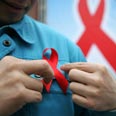
HIV infection rates on the rise in Israel
Figures compiled by Health Ministry show 5,658 people living with AIDS in Israel. Specialist warns level of fear has dropped, people less concerned about practicing safe sex
The figures were compiled by the Tuberculosis and AIDS Department at the Health Ministry and were recently presented in a conference on HIV medicine. In 2010, the number of people infected with AIDS totaled 430, while 456 additional HIV-positive cases (303 men and 153 women) were diagnosed in 2011.
A total of 5,658 people are living with AIDS in Israel – 3,512 of them are men; 2,303 arrived from countries with high rates of HIV; 1,263 are homosexuals, 768 inject drugs, 71 were infected in a heterosexual intercourse, and 178 are children who got the disease from their mothers during the pregnancy. The rest were infected for other reasons.
Dr. Daniel Elbirt, secretary of the Israeli Society for AIDS Medicine and a senior physician at the Kaplan Medical Center, warns that many people no longer see AIDS as a lethal disease.
"In the past, people would panic when I informed them they were HIV positive, and today they sometimes respond calmly. It appears that the level of anxiety has dropped and people are less concerned about practicing safe sex, although AIDS is still a chronic disease which requires a daily dosage of medication that may have side effects like headaches and stomach aches, and even heart and kidney disease and impaired cognition."
Yonatan Karni, director of the Israel AIDS Task Force, expressed his concern over the new figures, saying that "the numbers are likely to continue to climb in 2012.
"This concerning problem is at the bottom of the national list of priorities, and we need a significant government investment. Decision makers must support the task force's activity and add new generation medications to the health basket."










